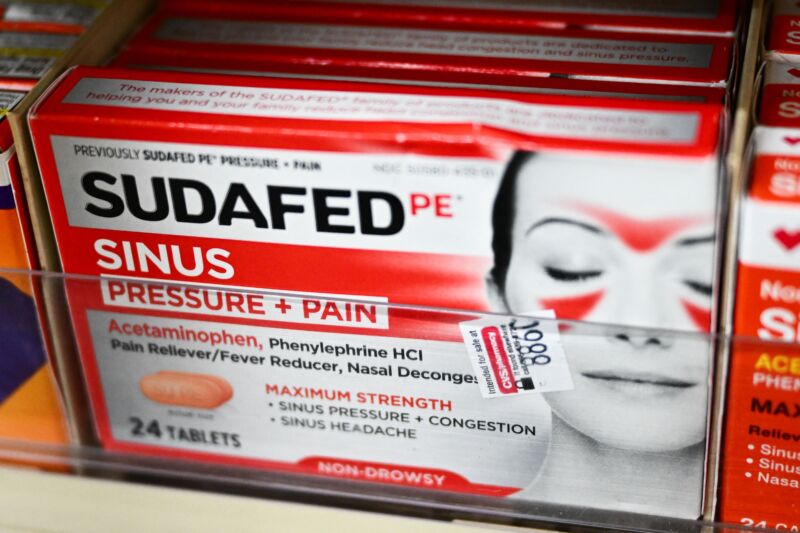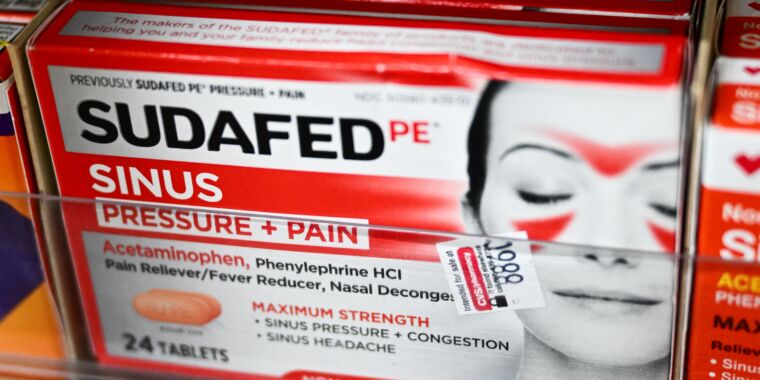
After spending decades on pharmacy shelves, the leading nasal decongestant in over-the-counter cold and allergy medicines has met its downfall.
Advisers for the Food and Drug Administration this week voted unanimously, 16 to 0, that oral doses of phenylephrine—found in brand-name products like Sudafed PE, Benadryl Allergy Plus Congestion, Mucinex Sinus-Max, and Nyquil Severe Cold & Flu—are not effective at treating a stuffy nose.
The vote was years in the making. In 2007, amid doubts, FDA advisers called for more studies. With the data that has trickled in since then, the agency’s scientists conducted a careful review and came to the firm conclusion that oral phenylephrine “is not effective as a nasal decongestant.”
Looking back, the FDA noted that key data supporting its original acceptance of phenylephrine in 1976 was likely “too good to be real.” And looking forward, the agency saw a bleak future for the drug. While this week’s vote concluding ineffectiveness applies only to the oral dosages currently approved for use, the FDA found that higher, potentially more effective doses of the drug could significantly increase blood pressure, posing a safety risk. “[T]here may be no path to evaluating higher doses,” the agency concluded.
To be clear, the advisers did not discuss phenylephrine-containing nasal sprays, which appear to have some efficacy. And, most importantly, the safety of phenylephrine-containing products is not in question; the FDA and its advisers did not raise any safety concerns. It’s safe, just useless.
Rise and fall
It’s still unclear how the FDA will proceed following the advisory panel’s vote, which it is not obligated to heed but usually does. But it’s certainly possible that widely used phenylephrine-containing medicines could eventually disappear from drug store aisles.
In a clarifying statement Thursday, the FDA noted there will not be a swift blowout of the popular decongestant. If the agency acts on the advisers’ votes and decides to wipe it off its list of effective over-the-counter drugs (the “OTC monograph”), the agency would first have to propose the removal from the monograph, then provide a public comment period, issue a final ruling, and work with manufacturers to reformulate products.
Still, however slow the process, if the FDA strips phenylephrine from the monograph, it will undoubtedly upend the over-the-counter cold and allergy medicine market. Popularity of phenylephrine skyrocketed after 2006, when its leading competition moved behind the pharmacy counter. The “Combat Methamphetamine Epidemic Act of 2005” went into effect that year, restricting sales of the more effective drug pseudoephedrine, which could be diverted to making methamphetamine. As pseudoephedrine use dropped, phenylephrine’s rose. By 2022, the FDA estimates that Americans bought 242 million phenylephrine-containing products, taking the lion’s share of the decongestant market and generating nearly $1.8 billion in sales.
Given phenylephrine’s overwhelming market success and complete clinical failure, it’s worth revisiting how we got here—and the FDA provides a deep dive on just that. The agency notes that the original 1976 acceptance of phenylephrine was based on just 14 studies—only 12 of which included efficacy data, and of those, only seven reported some level of positive efficacy data (though most were weakly positive). Eleven of the 14 studies were sponsored by a drug maker. Last, all the studies used a dubious measure of nasal airway resistance to assess effects on congestion. This is a highly variable, unvalidated method that is no longer accepted by the FDA in clinical trials.








